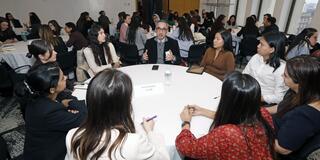SIPA Students Meet UN Experts at Annual Roundtable Event

During SIPA’s annual flagship event, on February 23, 17 experts from a range of international organizations met with 160 SIPA students to speak about their experience in the UN and share advice and insights about successful careers at international organizations.
Opening the 5th International Organizations & United Nations Roundtable Conversations, Professor Daniel Naujoks, director of SIPA’s International Organization & UN studies specialization, highlighted the special connection between the School and the United Nations. Since the inception of the School, SIPA has been privileged to work closely with international organizations and train our students to become leaders in multilateral organizations. At this moment, 120 faculty members are current or former UN staff members or advise various international organizations. More than 1,200 of our alumni are working for international organizations and through our new UN Partnership Initiative, SIPA is offering its expertise to support UN agencies and multilateral processes.
The UN Roundtable Conversations “offered a unique opportunity for students to engage in three 30-minute discussions with professionals from across the UN ecosystem, in small groups of 6-8,” reflects Michal Sabol MPA '25. He continues, “It was inspiring to see the shared commitment to making an impact and the pride in the UN's values and achievements among all the professionals. Personally, I found the advice on navigating a career within the UN system, ranging from immediate application strategies to long-term career development, to be incredibly valuable.”
Diletta Andreozzi MIA ’25, Vice President of SIPA’s student-led UN Association that co-sponsored the event, echoes the assessment of many participants. She describes the event as “a thought-provoking discussion with humanitarian and development experts that enlightened us about the diverse mandates and vital operations of various UN agencies and programmes.”
"Not only did I get the chance to engage with experts personally, but also got an understanding across a broad range of topics that the UN deals with.”
— Josephine Hebling MIA ’24
According to Bonnie Fisher MIA ’25, “the event was a great opportunity to engage more deeply with people currently working in the UN system and to have direct conversations about my interests and how they align with work in international organizations.” She was “particularly impressed with the complexity of the conversations–students came with insightful questions and the participants from the UN were candid and helpful. I came away from the event grateful for the strong connections I made and the insight I gained about some organizations I had not known much about previously.”
The experts shared their experiences from the UN Development Programme, the High Commissioner for Human Rights and Refugees, the World Bank, the International Fund for Agricultural Development, UN Offices for South-South Cooperation and of the Special Advisor on Africa, UNICEF, as well as the UN’s Anti-Racism Office, UN Peacebuilding Fund, the UN Development Coordination Office, Office for the Coordination of Humanitarian Affairs and the UN Operations and Crisis Centre. The topics covered by experts’ work ranged from peace and security, climate change and climate finance, to energy, digital technologies, migration, refugees, humanitarian action, and economic development, to advice for women in the field.
“Learning about the day-to-day activities from those who are actively working in the sector and connecting on common interests encouraged me to continue research on internship and job opportunities”, observes Will Thomason MIA ’25.
Josephine Hebling MIA ’24 feels that "it is rare to gain such close insights into the inner mechanisms of the United Nations as a graduate student. Not only did I get the chance to engage with experts personally, but also got an understanding across a broad range of topics that the UN deals with.”
Not only students benefitted from the interactions, the participating experts did too. Riad Meddeb, Director of UNDP’s Sustainable Energy Hub remarks, “My generation can always give guidance and lessons learned, but the young generation will always bring hope and a new spirit. Events like SIPA’s UN Roundtable are one of the best ways to transfer knowledge, inspiration, and wisdom in working in the development sector.”
After the roundtable conversations, the reception provided an opportunity for 170 students, SIPA faculty, and experts to mingle in a more informal setting. Will Thomason (MIA ’25) recalls, “During the post-roundtable reception, I was able to continue conversations about foreign language, fieldwork, and long-term plans with the representatives.”